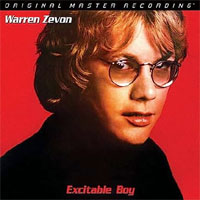Warren Zevon • Excitable Boy Asylum/Mobile Fidelity MFSL 2-513
Widely recognized as chief among Zevon’s dozen studio releases is 1978’s Excitable Boy, produced by longtime friends Jackson Browne and Waddy Wachtel. Dropping the needle on this album is like opening an action-packed collection of short stories by Elmore Leonard or Kurt Vonnegut. Some have described the characters in Zevon’s songs as hard-bitten. Chewed up and spit out might be more apt. Consider “Roland the Headless Thompson Gunner,” the anonymous "someone" that countries pay to do their dirty work. The song's lyrics were a collaboration between Zevon and David Lindell, a retired mercenary with whom he lived for a short time during Zevon's long struggle to reach the main stage of his bumpy career. Zevon’s elegiac piano lines and Russ Kunkel’s marching drum set up a gory indictment of political violence. Zevon’s cynical and sardonic worldview is a guiding principle throughout the album. Cuts like the title track that skewers a modern culture becoming increasingly blasť about senseless mayhem and “Veracruz” in which he eulogizes a historically obscure lost cause are certainly not everyone’s cup of tea. But Zevon suffused this work with an empathy and humanity that managed to attract enough fans for the album to be certified platinum. Stylistically, Excitable Boy is an artful combination of punk and new-wave sensibilities contained in a polished production package further strengthened by some of the best musicians in the business. For example, Zevon’s muscular piano chords coupled with Mick Fleetwood and John McVie’s tongue-and-groove rhythm work on “Werewolves of London” help turn what could have been a novelty song into one of the most memorable and subversive singles of the era. The original Asylum pressings of Excitable Boy I’ve heard over the years set a high bar for companies that choose to tackle a reissue of the album. The pressing I own [Asylum 6E-118], from PRC Recording Company in Richmond, Indiana, and marked "PRC" in the dead wax, has some rough spots thanks to careless previous owners, so I was eager to hear Mobile Fidelity Sound Lab’s 45rpm cut. The good news is that this limited-edition pressing is dead quiet and ruler flat. The rest of the story is a bit trickier. On my Technics SL-1200G turntable equipped with a Koetsu Black Goldline cartridge, the MoFi remaster lacks some of the midrange warmth and juicy low-end punch of my original pressing. In its defense, Mobile Fidelity’s version does have an upper-frequency sparkle and lengthier reverb trails than I hear on the original. To challenge my assessment, I invited several audiophiles with differing tastes over for auditions, and everyone quickly favored the original pressing. The sonic difference was most apparent when listening to Waddy Wachtel’s buzz-saw electric guitar on tracks like “Johnny Strikes Up the Band.” Those solos should have considerable bite, but the Mobile Fidelity cut seemed to highlight the upper frequencies and made us reach for the volume control. Russ Kunkel’s snare and high-hat strikes should display some shimmer, but they shouldn’t sizzle like bacon. When I brought the Mobile Fidelity release to a friend’s house who uses Magnepan LRS+ speakers and an Audio MusicKraft-modified Denon 103R cartridge, it sounded less strident but still came across as more brittle and overly clean compared to the warm, organic gestalt of the original Asylum pressing. For additional perspective, I compared Mobile Fidelity’s remaster to the latest high-resolution streaming files of the album. Both Tidal’s 24-bit/192kHz MQA and Qobuz’s 24-bit/192kHz PCM streams conveyed much of the original pressing’s considerably meatier low end and revealed a more balanced midrange than the Mobile Fidelity LP. While I could easily listen to the entire album on these streams without pausing, the Mobile Fidelity’s remastered LP was fatiguing. Given that I’ve purchased dozens of Mobile
Fidelity’s Original Master Recordings and consider many of them to be among the
finest vinyl I own, I was surprised by what I heard on this reissue. Other listeners’
mileage may vary based upon system synergy, but I’ll continue looking for a cleaner
pressing of the original release. |

 n the vast graveyard of troubled and underappreciated
creative geniuses, Warren Zevon deserves a significant monument. Alongside the likes of
Harry Nilsson and Alex Chilton, Zevon has legions of fans and famous admirers but has yet
to be given a place of honor in the so-called Rock & Roll Hall of Fame. It’s true
that Zevon might not have joined an elitist club that would have wanted him as a member,
but fans of the acerbic rocker would love for more people to discover the poignant lyrics
and fist-pumping, anthemic energy strewn throughout his quirky discography.
n the vast graveyard of troubled and underappreciated
creative geniuses, Warren Zevon deserves a significant monument. Alongside the likes of
Harry Nilsson and Alex Chilton, Zevon has legions of fans and famous admirers but has yet
to be given a place of honor in the so-called Rock & Roll Hall of Fame. It’s true
that Zevon might not have joined an elitist club that would have wanted him as a member,
but fans of the acerbic rocker would love for more people to discover the poignant lyrics
and fist-pumping, anthemic energy strewn throughout his quirky discography.